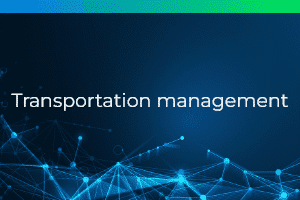What is transportation management?
The term transport management encompasses the control, optimization, monitoring and billing of transport processes.
The process begins with the receipt or recording of transport orders, which must be processed in the course of transport management with regard to optimized delivery costs, delivery time, delivery quality or climate effects. Depending on the optimization objective, the suitable modes of transport must first be selected and then the suitable carriers, shipping companies, rail or air transport operators.
As a rule, cost efficiency plays the biggest role. Efficient transport management is the key to optimized costs in logistics. There is potential for optimization in the following areas:
- Selection of carriers
- Selection of shipping companies, rail or air transport operators
- scheduling
- Route planning
- Optimization of transport processing
- Analysis of transportation and tariff costs
- Consolidating and bundling transports
In addition to the costs, however, the climate effects of transportation are also increasingly coming to the fore. If the transport has to be carried out particularly quickly and reliably, the costs and the impact on the environment can often be given less consideration.
The decisions on the mode of transport and carrier are made by dispatchers or shipping managers. A large number of factors have to be taken into account. In the case of road transportation with own vehicles, for example, driving and rest times, driver qualifications (e.g. when transporting hazardous goods), roadworks and detour, vehicle availability and acceptance times at the recipient’s ramp must all be factored into the planning.
Transport management is therefore a complex process that is increasingly supported by transport management systems (TMS) or freight forwarding software. Modern TMS work with databases in which the delivery times and other restrictions (e.g. “narrow access, only accessible by motor vehicle” or “delivery only with tail lift”) can be stored for each unloading point. These are then automatically taken into account during route planning. Route plans that take all restrictions into account lead to cost-efficient processes.
